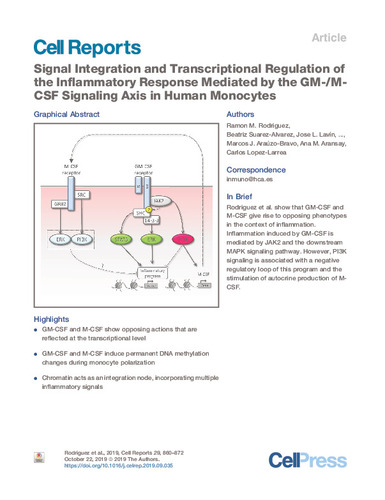Signal Integration and Transcriptional Regulation of the Inflammatory Response Mediated by the GM-/M-CSF Signaling Axis in Human Monocytes
Autor(es) y otros:
 ; Lavín, José L.; Ascensión, Alex M.; González, Monika; Lozano, Juan J.; Raneros, Aroa B.; Bulnes, Paula D.; Vidal Castiñeira, Jose R.; Huidobro Fernández, Covadonga
; Lavín, José L.; Ascensión, Alex M.; González, Monika; Lozano, Juan J.; Raneros, Aroa B.; Bulnes, Paula D.; Vidal Castiñeira, Jose R.; Huidobro Fernández, Covadonga ; Martín Martín, Cristina; Sanz, Ana B.; Ruiz Ortega, Marta; Puig Kröger, Amaya; Corbí, Angel L.; Araúzo Bravo, Marcos J.; Aransay, Ana M.; Lopez Larrea, Carlos
; Martín Martín, Cristina; Sanz, Ana B.; Ruiz Ortega, Marta; Puig Kröger, Amaya; Corbí, Angel L.; Araúzo Bravo, Marcos J.; Aransay, Ana M.; Lopez Larrea, Carlos
Palabra(s) clave:
inflammatory response
transcriptional regulation
GM-/M-CSF
DNA methylation
chromatin
Fecha de publicación:
Editorial:
Cell Press
Versión del editor:
Citación:
Descripción física:
Resumen:
In recent years, the macrophage colony-stimulating factor (M-CSF) and granulocyte-macrophage CSF (GM-CSF) cytokines have been identified as opposing regulators of the inflammatory program. However, the two cytokines are simultaneously present in the inflammatory milieu, and it is not clear how cells integrate these signals. In order to understand the regulatory networks associated with the GM/M-CSF signaling axis, we analyzed DNA methylation in human monocytes. Our results indicate that GM-CSF induces activation of the inflammatory program and extensive DNA methylation changes, while M-CSF-polarized cells are in a less differentiated state. This inflammatory program is mediated via JAK2 associated with the GM-CSF receptor and the downstream extracellular signal-regulated (ERK) signaling. However, PI3K signaling is associated with a negative regulatory loop of the inflammatory program and M-CSF autocrine signaling in GMCSF- polarized monocytes. Our findings describe the regulatory networks associated with the GM/MCSF signaling axis and how they contribute to the establishment of the inflammatory program associated with monocyte activation.
In recent years, the macrophage colony-stimulating factor (M-CSF) and granulocyte-macrophage CSF (GM-CSF) cytokines have been identified as opposing regulators of the inflammatory program. However, the two cytokines are simultaneously present in the inflammatory milieu, and it is not clear how cells integrate these signals. In order to understand the regulatory networks associated with the GM/M-CSF signaling axis, we analyzed DNA methylation in human monocytes. Our results indicate that GM-CSF induces activation of the inflammatory program and extensive DNA methylation changes, while M-CSF-polarized cells are in a less differentiated state. This inflammatory program is mediated via JAK2 associated with the GM-CSF receptor and the downstream extracellular signal-regulated (ERK) signaling. However, PI3K signaling is associated with a negative regulatory loop of the inflammatory program and M-CSF autocrine signaling in GMCSF- polarized monocytes. Our findings describe the regulatory networks associated with the GM/MCSF signaling axis and how they contribute to the establishment of the inflammatory program associated with monocyte activation.
ISSN:
Patrocinado por:
This work was supported by grants from the Plan Nacional de I+D+I 2013– 2016 ISCIII (Institute of Health Carlos III; PI16/01318, PI17/01244, PI17/ 0119, PI16/1900, and PI19/00184); the Gobierno del Principado de Asturias; the PCTI-Plan de Ciencia, Tecnología e Innovación 2013-2017 (grant IDI/ 2018/144); FEDER ‘‘Funding Program of the European Union’’; the Red Española de Investigación Renal (REDinREN) (RD16/0009/0020, RD016/0009/002, and RD016/0009/001); the Agencia Estatal de Investigación (AEI) (ayuda Juan de la Cierva-Incorporaciόn; IJCI-2017-33347 to R.M.R.); and the Instituto de Salud Carlos III (Contratos Sara Borrell; CD16/00033 to C.H.). CIC bioGUNE support was provided by the Basque Department of Industry, Tourism and Trade (Etortek and Elkartek programs), the Innovation Technology Department of Bizkaia County, the CIBERehd Network, and Spanish MINECO, the Severo Ochoa Excellence Accreditation (SEV-2016-0644).
Colecciones
- Artículos [37538]
- Biología Funcional [805]
- Investigaciones y Documentos OpenAIRE [8403]
Ficheros en el ítem




